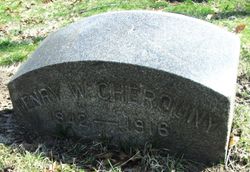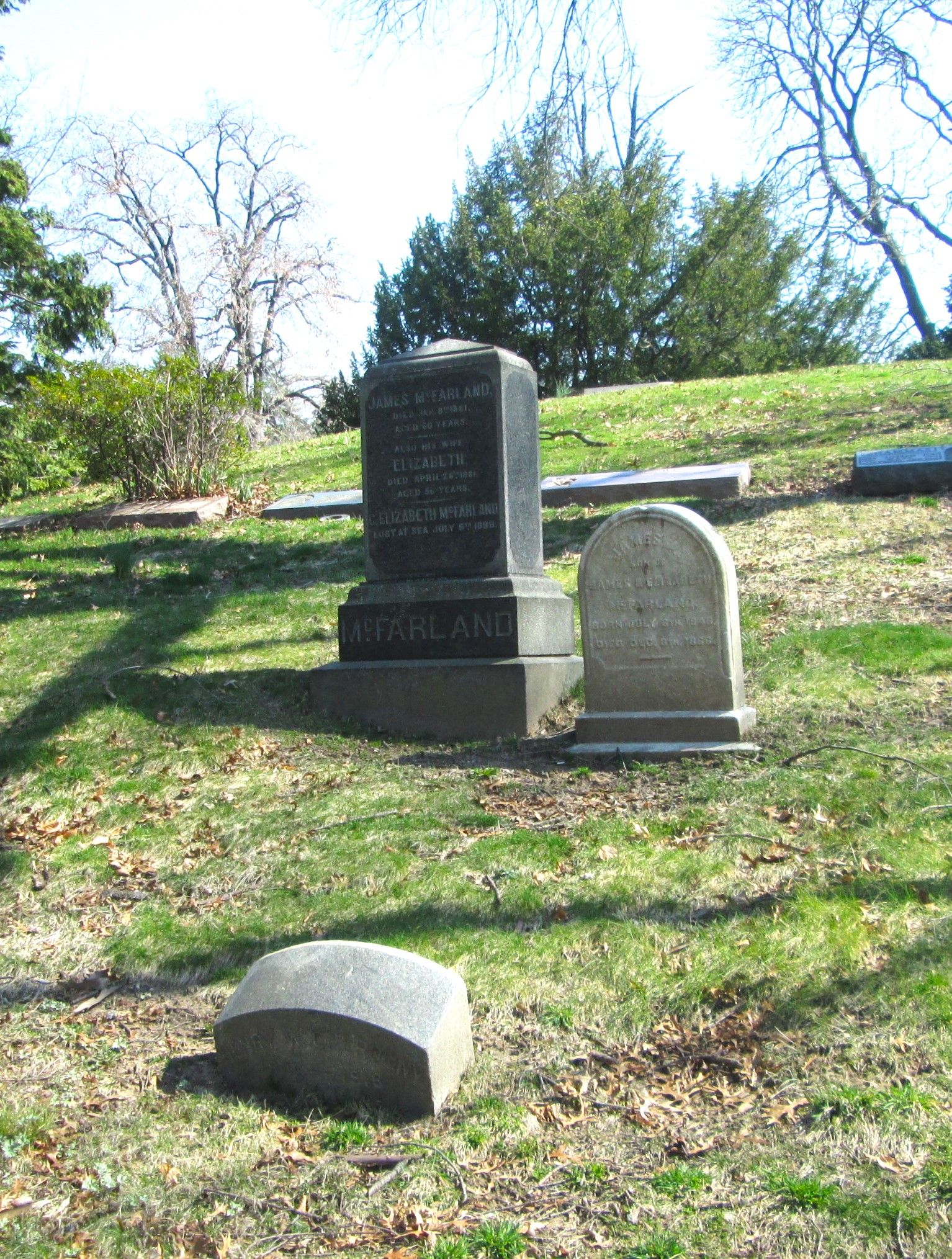In the spring of 1861, Henry Cherrum volunteered as a private in Company A, 2nd Missouri Infantry Regiment (3 months, 1861) for three months' service. On November 12, 1861, Henry Cheronney/Cherouny/Chevauny enlisted for three years' service in Company A, 1st New York Marine Artillery Regiment as a private (ordinary seaman), until being discharged for disability on December 5, 1862 in Newbern, North Carolina. The Marine Artillery was a unit raised in 1861 by Col. William A. Howard to man Union gunboats for three years. It participated in the Burnside Expedition of 1862. The men had been promised more pay than they received and a scandal erupted in the fall of 1862. 300 men mutinied and the unit was disbanded in December, 1862.
Henry became a citizen in 1864 in New York City and later moved to Hoboken, New Jersey. Henry and his wife Mary had eight children, five of whom survived. Henry started his own printing company in 1878 and incorporated it in 1884. He was a charter member of the Printers' League and a pioneer to embrace the use of the linotype.
In 1885, Henry W. Cherouny was the wealthy and well-known owner of the Cherouny Printing & Publishing Company (Buchdruckerei von H. Cherouny) in the Munro Publication Building at 17, 19, and 21 Vandewater Street, New York City (Until 1970, Vandewater Street ran from Frankfort to Pearl Streets one block east of Rose Street), living in style on Lexington Avenue and there co-habitating with his concubine. His wife Mary Cherouny, meanwhile, was living in scantily furnished apartments in Harlem. Mr. Cherouny had been having an affair with a certain Miss Fredericks, the vice president of his publishing company.
On October 21, 1885, in addition to divorce proceedings already underway, Mary Cherouny began a criminal action against him, her eldest son William, and her husband's foreman Henry Beyer for kidnapping her in order to waylay her. The sensational trial became the talk of the town. Mary stated that in February of 1883 William, in cahoots with his father, had lured her on a bogus rail journey out west, during which she had been drugged, for the purpose of kidnapping her youngest daughter Josephine. In addition, in the meantime, her two youngest sons, Henry (Jr.) and Frederick, had emptied her apartment while she had been waylaid. Mr. Cherouny claimed that the furniture belonged to him. Mary outlined how Cherouny had become enamored in 1878 of Miss Elizabeth Fredericks, whom he had later made the vice president of his company. Cherouny had had a child with her, Arthur Ernest Cherouny in 1879. Mr. Cherouny and Miss Fredericks were married in 1888. The judge issued an order of habeus corpus for Josephine.
The habeus corpus proceedings began in the Supreme Court of King's County on October 24, 1885 in the criminal case brought by Mary Cherouny against her wealthy husband to produce her daughter Josephine. Josephine appeared but Mr. Cherouny did not appear, so the case was continued until the 31st. Cherouny counter-alleged that he and his wife had agreed to separate in 1883, which she denied, as well as that she had intemperate habits and unbecoming conduct, and that she had attempted to poison him. Mrs. Cherouny alleged that Josephine, who was now in the custody of Mr. Philip Kline, had been kidnapped by her husband's agents.
In reference to this, Mr. Cherouny, his son William A., and his foreman Henry Beyer had been arraigned on October 21st on the kidnapping charge. The three defendents were released on their own bonds but did not appear for their hearing on November the 23rd. William and Beyer were re-arrested, but Mr. Cherouny had liquidated his interests in his printshop on Vanderwater Street and had fled to Germany.
On December 13, 1885, Freddy Cherouny vouched for his mother's temperance and testified that he had both helped to kidnap his sister and that he had taken the furniture at his father's instigation. His brother William, an employee of Cherouny's, testified against his mother and his brother Freddy. Mary produced a number of character witnesses. It was revealed that Freddy had also asked Cherouny for money in return for not exposing his father's wrongdoing and intemperance. Little Josephine also tearfully participated in the proceedings. The judge allowed her to remain with the Kleins until the divorce proceedings were finalized.
On June 20, 1886, Mrs. Cherouny, through counsel, produced articles of separation made in 1868, wherein Mr. Cherouny had agreed to pay his wife six dollars (~$98 in 2013) weekly if she would separate from him. An order for alimony had been entered on July 21, 1884 as well. Mr. Cherouny had left the country on April 10, 1886 and had fallen in arrears in his payments. On June 9, 1886, Cherouny wrote from Germany stating that he intended to divorce her there and that he would never return to America.
After two years, the sordid case ended on November 6, 1886 in victory for Mary Cherouny as she was awarded custody of Josephine and ten dollars (~$250 in 2013) a week alimony.
Cherouny went on in 1901 to have a second child with his new wife Elizabeth Fredericks (Faehndrich née Fandrich), namely Helen Ellise Cherouny (later Durkin).
Henry W. Cherouny, who had come from Germany to become an American, a successful printer and publisher and who had fought to preserve the Union, died in March of 1916, a little more than a year before his adopted land's president would lead America down the path of anti-German hysteria, to include the burning of German-language books and the re-naming of dachshunds and sauerkraut.
In the spring of 1861, Henry Cherrum volunteered as a private in Company A, 2nd Missouri Infantry Regiment (3 months, 1861) for three months' service. On November 12, 1861, Henry Cheronney/Cherouny/Chevauny enlisted for three years' service in Company A, 1st New York Marine Artillery Regiment as a private (ordinary seaman), until being discharged for disability on December 5, 1862 in Newbern, North Carolina. The Marine Artillery was a unit raised in 1861 by Col. William A. Howard to man Union gunboats for three years. It participated in the Burnside Expedition of 1862. The men had been promised more pay than they received and a scandal erupted in the fall of 1862. 300 men mutinied and the unit was disbanded in December, 1862.
Henry became a citizen in 1864 in New York City and later moved to Hoboken, New Jersey. Henry and his wife Mary had eight children, five of whom survived. Henry started his own printing company in 1878 and incorporated it in 1884. He was a charter member of the Printers' League and a pioneer to embrace the use of the linotype.
In 1885, Henry W. Cherouny was the wealthy and well-known owner of the Cherouny Printing & Publishing Company (Buchdruckerei von H. Cherouny) in the Munro Publication Building at 17, 19, and 21 Vandewater Street, New York City (Until 1970, Vandewater Street ran from Frankfort to Pearl Streets one block east of Rose Street), living in style on Lexington Avenue and there co-habitating with his concubine. His wife Mary Cherouny, meanwhile, was living in scantily furnished apartments in Harlem. Mr. Cherouny had been having an affair with a certain Miss Fredericks, the vice president of his publishing company.
On October 21, 1885, in addition to divorce proceedings already underway, Mary Cherouny began a criminal action against him, her eldest son William, and her husband's foreman Henry Beyer for kidnapping her in order to waylay her. The sensational trial became the talk of the town. Mary stated that in February of 1883 William, in cahoots with his father, had lured her on a bogus rail journey out west, during which she had been drugged, for the purpose of kidnapping her youngest daughter Josephine. In addition, in the meantime, her two youngest sons, Henry (Jr.) and Frederick, had emptied her apartment while she had been waylaid. Mr. Cherouny claimed that the furniture belonged to him. Mary outlined how Cherouny had become enamored in 1878 of Miss Elizabeth Fredericks, whom he had later made the vice president of his company. Cherouny had had a child with her, Arthur Ernest Cherouny in 1879. Mr. Cherouny and Miss Fredericks were married in 1888. The judge issued an order of habeus corpus for Josephine.
The habeus corpus proceedings began in the Supreme Court of King's County on October 24, 1885 in the criminal case brought by Mary Cherouny against her wealthy husband to produce her daughter Josephine. Josephine appeared but Mr. Cherouny did not appear, so the case was continued until the 31st. Cherouny counter-alleged that he and his wife had agreed to separate in 1883, which she denied, as well as that she had intemperate habits and unbecoming conduct, and that she had attempted to poison him. Mrs. Cherouny alleged that Josephine, who was now in the custody of Mr. Philip Kline, had been kidnapped by her husband's agents.
In reference to this, Mr. Cherouny, his son William A., and his foreman Henry Beyer had been arraigned on October 21st on the kidnapping charge. The three defendents were released on their own bonds but did not appear for their hearing on November the 23rd. William and Beyer were re-arrested, but Mr. Cherouny had liquidated his interests in his printshop on Vanderwater Street and had fled to Germany.
On December 13, 1885, Freddy Cherouny vouched for his mother's temperance and testified that he had both helped to kidnap his sister and that he had taken the furniture at his father's instigation. His brother William, an employee of Cherouny's, testified against his mother and his brother Freddy. Mary produced a number of character witnesses. It was revealed that Freddy had also asked Cherouny for money in return for not exposing his father's wrongdoing and intemperance. Little Josephine also tearfully participated in the proceedings. The judge allowed her to remain with the Kleins until the divorce proceedings were finalized.
On June 20, 1886, Mrs. Cherouny, through counsel, produced articles of separation made in 1868, wherein Mr. Cherouny had agreed to pay his wife six dollars (~$98 in 2013) weekly if she would separate from him. An order for alimony had been entered on July 21, 1884 as well. Mr. Cherouny had left the country on April 10, 1886 and had fallen in arrears in his payments. On June 9, 1886, Cherouny wrote from Germany stating that he intended to divorce her there and that he would never return to America.
After two years, the sordid case ended on November 6, 1886 in victory for Mary Cherouny as she was awarded custody of Josephine and ten dollars (~$250 in 2013) a week alimony.
Cherouny went on in 1901 to have a second child with his new wife Elizabeth Fredericks (Faehndrich née Fandrich), namely Helen Ellise Cherouny (later Durkin).
Henry W. Cherouny, who had come from Germany to become an American, a successful printer and publisher and who had fought to preserve the Union, died in March of 1916, a little more than a year before his adopted land's president would lead America down the path of anti-German hysteria, to include the burning of German-language books and the re-naming of dachshunds and sauerkraut.
Family Members
Sponsored by Ancestry
Advertisement
Advertisement




